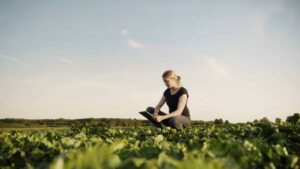Continuing to achieve high-yielding harvests into the future means farmers are having to increasingly adapt to climate changes and strengthened agrochemical regulations. At the same time, they are experiencing intensifying pressure from agricultural pests and plant diseases that threaten crop yields.
Growers find themselves ensnared in the difficult dichotomy of operating both economically and ecologically. This makes it all the more important to develop resistant varieties that ensure productive harvests while reducing the need to use fertilizers and agricultural chemicals. KWS demonstrates how it’s possible to create sustainable cultivation systems by making progress in seed innovation: With an eye firmly fixed on the future, the seed specialists at the company have steadfastly worked to develop sugarbeet varieties that combine Cercospora tolerance with high-yield performance — a painstaking pursuit rewarded by the successful development of CR+ varieties that have strong tolerance to the diesease.
Cercospora beticola is one of the most harmful leaf diseases to impact sugar beets, and fungal infections can lead to yield losses of up to 50 per cent. Climate change is a contributing factor to both the spread and the increasingly severe manifestation of Cercospora, and roughly two third of the global sugarbeet acreage are characterized by a risk of moderate to high Cercospora pressure. Mild winters and warm, humid summers promote the infection in typical Cercospora regions. Thanks to its various agricultural advantages, sugarbeet plays a valuable role in actively protecting soil and water as part of extensive crop rotation. This makes it all the more important that varieties offer a certain amount of tolerance to Cercospora. This tolerance already exists, but there is a catch: Beet growers have had to accept yield losses if they chose varieties with a high level of Cercospora tolerance. This has been especially the case if there was less disease pressure on the land. And farmers face another problem: To control the leaf disease, fungicides can be applied, but many pathogens develop a resistance to pesticides and many pesticides are subject to regulations.
KWS CR+ varieties: Tolerant, sustainable, high-yielding
Breeders at KWS started searching for new ways to control Cercospora 20 years ago and discovered the relevant trait in a wild beet that is closely related to the sugarbeet. Combining that trait with naturaly more tolerant varieties, the new CR+ varieties offer unprecedented protection against Cercospora. Farmers are not only able to count on high-yield performance on land with and without infestations, they are also able to make less use of fungicides. In North America, for example, based on farmer feedback, KWS concludes that for this region an average of two fungicide applications per year can be saved.[1]This drives down costs and lessens negative effects on soils, water, the climate and biodiversity. At the same time, farmers who grow CR+ varieties make an important contribution to promoting greater sustainability in agriculture while also securing the profitability of sugarbeet cultivation for the future.
[1] These assumptions are based on feedback covering total of 40,000 acres of CR+ varieties, cultivated over a span of two years.








